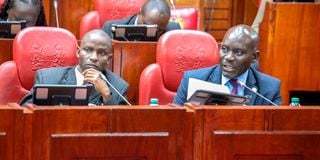Premium
Worldcoin is a threat to economy and national security, MPs told

National Computer and Cybercrimes Coordination Committee Director James Kimuyu (left) and Dr David Njoga field questions from members of an ad hoc committee of the National assembly that is investigating the activities of Worldcoin at County Hall in Nairobi on August 29, 2023.
The National Computer Cybercrimes Coordinating Committee (NC4) has warned that the activities of cryptocurrency Worldcoin could impact negatively on the economy and national security.
This, as it emerged that over 350,000 Kenyans had registered with Worldcoin within a week of its launch towards the end of July before the government suspended its operations over fears of data breaches.
The mining of sensitive data from Kenyans by Worldcoin was spearheaded by Ms Wangechi Mwangi and Ms Rael Mwende, both of whom are Kenyans.
It is feared that jobless, desperate and gullible Kenyans will continue to sign up, recruit their friends and family even as Worldcoin’s operations in the country remain frozen.
Yesterday, NC4 director Colonel James Kimuyu while appearing before an ad hoc committee of the National Assembly investigating the controversial activities and operations of World coin in Kenya, noted that the impact can vary based on factors like regulatory environment, adoption rate, technological developments and public perception.
He noted that Worldcoin could affect monetary policy and control, compromise cybersecurity of critical national infrastructure and privacy and security, enhance cybercrime fraud and scams and terrorism financing among others.
“National security concerns surrounding a global digital currency like Worldcoin can be significant due to its potential impact on a country’s economic, financial sovereignty,” said Dr Kimuyu, adding that “the legality of Worldcoin data collection is under scrutiny.”
The 15-member committee chaired by Narok North MP Gabriel Tongoyo was established by National Assembly Speaker Moses Wetang’ula on August 15 to probe the matter and submit a report to the House by September 28. It draws five members each from the committees on Administration and Internal Affairs and Communication, Information and Innovation and Tourism and Wildlife.
The probe into the activities of cryptocurrency project Worldcoin came into light on August 2 after the government announced the suspension of its operations in the country as it assessed potential risks to health and public data safety.
The Worldcoin project, founded by OpenAI CEO Sam Altman, launched its operations in the country from as early as April 2022. The project required users to give their iris scans in exchange for a digital ID also called World ID and free cryptocurrency as part of the plans “to create a new identity and financial network.” However, a preliminary review of Worldcoin's operations in the country by the Communications Authority of Kenya (CA) and the Office of Data Protection Commissioner (ODPC) raised concerns about the firm’s activities. The agencies noted that obtaining consumer consent in return for monetary award bordered on inducement that has the dangers of paving the way for data infringement, which is not allowed by the Kenyan laws.
About Sh7,000 in cryptocurrency was being paid to every Kenyan who subjected their irises to scans.
The NC4 was established under the Computer Misuse and Cybercrimes Act of 2018 as the national cyber-security point of contact responsible for coordination and management of all cyber-security matters in the country.
One of the key features of Worldcoin’s entry into Kenya is the launch of a peer-to-peer (P2P) exchange that allows individuals to quickly and easily access digital currencies and US dollars directly with one another, without the need for a centralised third party to facilitate the transactions. The cryptocurrency industry in Kenya has been steadily growing in recent years with an estimated four million active users in the country.





